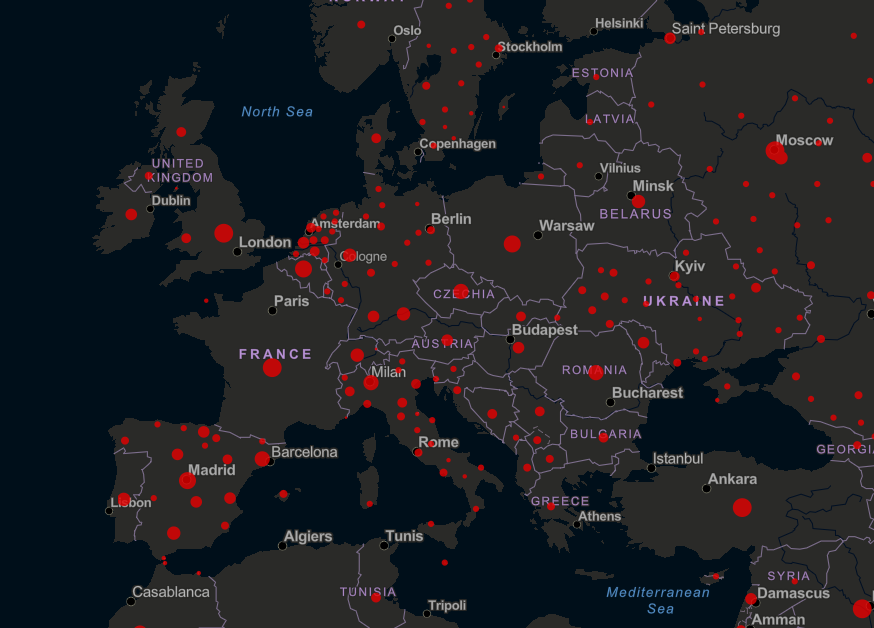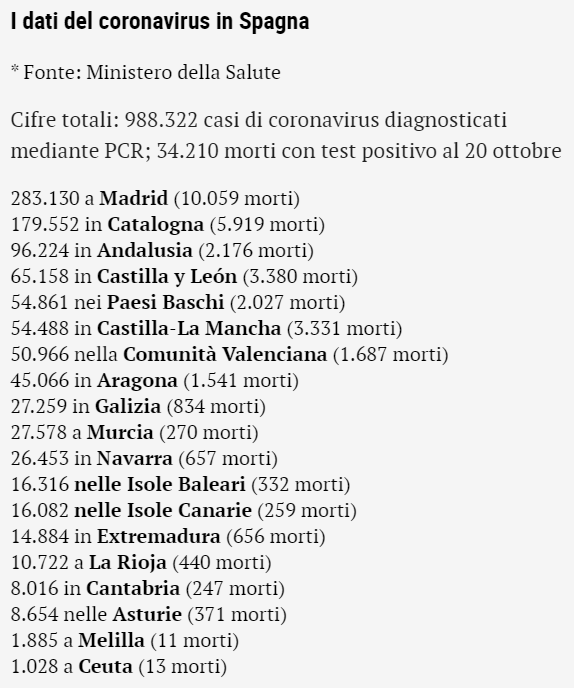Covid, what happens in Belgium, Spain and Ireland

Spain opts for a night curfew, while Ireland restores the lockdown. Cases are on the rise in Belgium, which evaluates new restrictions. The point
A month has passed since the beginning of autumn and the data on the second wave of Covid show a decidedly alarming situation in Europe. As Ireland returns to lockdown, Spain will try to curb Covid infections with a night curfew. The situation is also serious in Belgium, where, with the hospitals collapsing, new restrictive measures are expected.
Let's go step by step.
CASES ON THE RISE
Is Covid seasonal? No, because it didn't disappear in the summer. Yes, because in these cold days the cases have returned to increase dramatically. In half of the 48 countries in the Europe area that are part of the UN agency, in particular, the cases of Covid-19 have increased by 50%.
WHO: QUARANTINE NOT ADEQUATE
Fault, according to WHO emergency director Michael Ryan, of an inadequate quarantine. Contacts from Covid, according to the World Health Organization, "have not been quarantined for an adequate period". This, adds Ryan, "has not happened everywhere and in a systematic way, but I am convinced that it is the main reason why we are seeing such high numbers".
THE NUMBERS OF IRELAND
Ireland recorded over 52,000 Covid cases and over 1,860 deaths from February to October 20. In the 24 hours between 19 and 20 October the new cases were 1,263.
LOCKDON RETURNS TO IRELAND
The numbers have raised concern in Prime Minister Micheal Martin, who has decided to restore the lockdown to try to lower the infections from Covid. Ireland will suspend all non-essential activities for six weeks from midnight on 21 October. Private parties are also prohibited : a fine of 1,000 euros (or a month's imprisonment) for those who organize meetings with friends at home.
Schools and childcare facilities remain open: "We cannot and will not allow the future of our children and young people to become another victim of this disease," said Martin.
Wales should also block all non-essential activities from Friday.
THE NUMBERS OF SPAIN
Significantly higher numbers are those affecting Spain: 988,322 cases of coronavirus diagnosed since the beginning of the pandemic. 34,210 died with a positive test as of 20 October.
We must prepare for "very difficult weeks: the second wave is a reality throughout Europe", warned the Spanish Minister of Health Salvador Illa, anticipating the possibility of introducing measures to "reduce the mobility of contacts".
NIGHT COVER
Among the measures Madrid is thinking of is the night curfew. Health Minister Enrique Ruiz Escudero announced a measure to limit mobility from midnight to 6am. Curfew already from midnight today, however, for the three Aragonese capitals, Zaragoza, Huesca and Teruel , as decided by the regional government.
BELGIUM: HOSPITALS DO NOT HOLD
Collapse also in Belgian hospitals, where the test positive rate is 15.8%. There are always "More patients and fewer staff: the system does not hold up", say insiders.
According to the numbers reported by Le Soir, currently in Belgium, there are 2,969 Covid-19 patients hospitalized, of whom 486 are in intensive care, according to the Wednesday morning update released by the Sciensano Public Health Institute.
The average number of new daily contaminations, calculated between 11 and 17 October, continues to increase and stands at 8,975 (+ 68%). Between 14 and 20 October, hospitalizations showed a continuous growth trend, with an average of 295.4 daily hospitalizations (+ 94%). Between 11 and 17 October, the virus killed an average of more than 32 people (+14) per day.
BELGIUM: MORE RESTRICTIVE MEASURES ARE NEEDED
“People aren't necessarily aware of the numbers. If we continue like this, in the next few weeks, we will reach the saturation of our hospital capacity, ”said Liberal Senator Georges-Louis Bouchez.
"One in two Belgians no longer complies with anti-contagion measures, and this is a very serious problem".
TOWARDS NEW MEASURES?
"We will have to take much stricter measures if we want to regain control of the spread of the virus", continued Bouchez , specifying that "in terms of social choice, schools should be closed as late as possible and I hope we shouldn't," he added. .
This is a machine translation from Italian language of a post published on Start Magazine at the URL https://www.startmag.it/mondo/covid-che-cosa-succede-in-belgio-spagna-e-irlanda/ on Wed, 21 Oct 2020 13:50:06 +0000.

